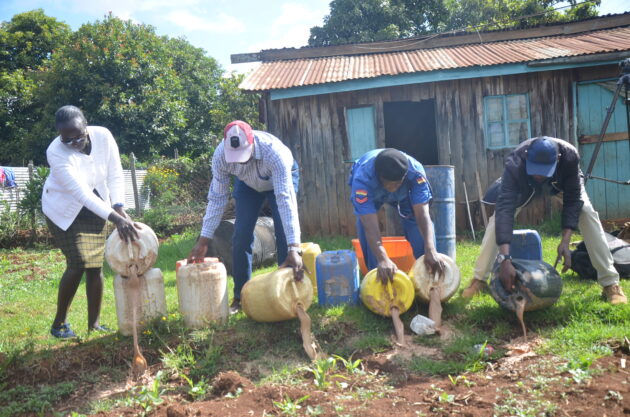
Euromonitor Study » Capital News
NAIROBI, Kenya, May 13 – Illicit alcohol now accounts for 60 per cent of all alcohol sold, and illegal alcohol sold in Kenya has increased by 27 per cent since 2022, according to a study by Euromonitor International.
The illicit alcohol market continues to grow in both volume and value and growth in the illicit market has exceeded that in the legal market over the last two years.
The study commissioned by the Alcoholic Beverages Association of Kenya (ABAK) established that the government is losing Sh120 billion annually in foregone taxes, mostly because of homemade brews and illegally made spirits.
Fiscal loss of Sh120 billion is mostly due to the artisanal brewing and illicit manufacturing of spirits. Fiscal losses have grown by 68 per cent since 2022.
Homemade brews like muratina and chang’aa make up most of the 60 per cent illicit alcohol people drink but the real money in the illegal alcohol trade comes from smuggling, counterfeit brands and tax cheating. Although illicit artisanal homebrew represents 67% of the illicit alcohol market, most of the illicit alcohol value lies in smuggling, counterfeits and tax leakage.
Most of the money lost by the government is because of tax leakage, about KSh73 billion, followed by counterfeit and fake brands, which cost an estimated KSh64 billion.
The study has established that higher alcohol taxes are pushing more people toward cheaper, illegal options. The illegal options are powered by the smuggling of ethanol, which has increased, and the study also found that losses from smuggling alone have doubled since 2022,” said ABAK chairman Eric Githua. . The smuggling of ethanol increased, with the tax loss related to smuggling increasing by 144% since 2022.
Mr Githua said the study calls for a collaborative effort to help tackle the menace of illicit alcohol in the country.
“Our aim when we commissioned this study is to help the government understand the size of the problem, comparing it to the 2023 study, as well as identify ways to combat this issue,” said Mr Githua.
The study was carried out to establish the prevalence of illicit alcohol in the country, which has over the years continued to claim lives and maim consumers as the Government struggles to contain the menace.
Because of the clandestine and informal nature of the illicit alcohol trade, it is difficult to obtain official data, and Government agencies often lack accurate statistics because such activities are unregulated, unreported, and frequently operate outside legal frameworks. Illicit alcohol continues to be widespread, impacting spirits, beer and wine. While counterfeit and contraband alcohol are key types of illicit alcohol, artisanal brews such as Busaa and Changaa are much more widely available and are increasingly produced on a commercial scale.
Industry Principal Secretary Dr Juma Mukhwana said the study establishes a good base from which to generate the policies and actions necessary to curb the production and sale of illicit liquor.
“This latest study confirms what we have all along suspected; that the illicit market has grown bigger than the legal market. It is mainstrteam, it is organised and it is big. As we seek to eliminate illicit alcohol, we must learn from studies such as this one commissioned by ABAK to create strategies and tactics that protect the legal alcohol, fight the illicit alcohol and maintain the culture and traditions of our people in regards to alcohol,” said Dr Mukhwana in a speech read on his behalf by Karanja Njora, the Secretary for Administration in the ministry.
Assistant Inspector General Cunningham Suiyanka described the findings of the study as alarming and a warning that Kenya risks losing a generation to illicit alcohol.
“This report is a good first step, and we now need to go back to the drawing board and see what is the next step. We need to start acting now. My biggest enemy is a counterfeit drink. The counterfeit drink is more dangerous than chang’aa so let’s act urgently,” said Mr Suiyanka.
Beverly Opora, Secretary of Administration at the Ministry of Interior, described the trade in illicit alcohol as a major concern for the ministry.
“Illicit alcohol is a major risk to internal security as it leads to organised crime. Many of our brothers in jail were under the influence when they committed the crimes,” said Ms Opora.
The study also established that while consumers know what makes alcohol illegal, like when it’s smuggled or fake, and they understand the risks, many of them still buy and sell illegal alcohol, and in many communities, it’s seen as normal and socially acceptable.
Consumers are motivated to buy illicit alcohol because of its lower prices, accessibility through informal channels like street vendors and residential homes and the desire for premium brands at lower costs, according to the study.
The prevalence of illicit alcohol is driven by high excise taxes on legal alcohol, affordability and accessibility, weak enforcement and corruption and the cultural acceptance of homemade brews.
To combat illicit alcohol, the study recommends three tactics: Tighten ethanol regulations and harmonise excise duties regionally, Increase consumer awareness through social media and public campaigns, and strengthen enforcement mechanisms and penalties.